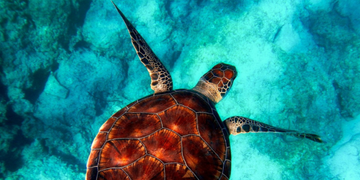How can we protect the oceans for future generations?
Oceans, comprising more than 70% of the Earth's surface, are the source of life for millions of species and individuals worldwide. Unfortunately, these vast blue expanses are currently facing serious threats such as pollution, overfishing, climate change, and the loss of marine habitats. To ensure that future generations can also benefit from the resources and beauty that the oceans provide, it is imperative that we take immediate and concerted action to protect them. In this article, we explore some key strategies for preserving these precious marine ecosystems.
Reduce plastic consumption

Plastic pollution is one of the most pressing problems facing our planet's oceans. To protect future generations, we must reduce the production of single-use plastics and promote recycling. Implementing stricter regulations on plastic waste is essential to prevent our oceans from turning into seas of plastic. For example, you can replace plastic bags with a reusable tote bag for all your belongings.
Indeed, every small action counts in reducing our ecological footprint. One simple action we can all take is to replace plastic bottles with stainless steel or glass water bottles. This change has a major impact on preserving our planet because plastic takes hundreds of years to decompose.
Stainless steel and glass water bottles offer many advantages. First of all, their composition guarantees the absence of harmful chemicals such as bisphenol, which are often found in plastics. Stainless steel and glass also provide better thermal insulation than plastic.
Natural sunscreens

Choosing sunscreens that are reef-safe is a responsible act that allows you to enjoy the pleasures of the beach while preserving marine biodiversity. When we swim in the ocean with these creams, these chemicals can be released into the water, leading to disastrous consequences for corals and marine ecosystems. Indeed, many existing sunscreens on the market do not have optimal compositions for our beautiful blue waters. This is where reef-safe sunscreens come in. These products are formulated with natural and safe ingredients that provide effective sun protection without harming the marine environment. Many brands have committed to creating sunscreens based on non-nano zinc oxide and mineral filters, which remain on the skin's surface and do not penetrate the water in the same way as traditional chemicals. Thus, you can swim with peace of mind, knowing that you are not adding harmful chemicals to the ocean.
A solution for your cigarettes

Rather than burying cigarette butts in the sand, a practical and environmentally friendly alternative is to use a pocket ashtray.
Cigarette butts, composed of plastic filters and harmful chemical residues, represent one of the most common and harmful forms of pollution in outdoor spaces. When discarded on the sand, these butts can end up being carried away by the wind or waves, leading to environmental degradation and a threat to marine wildlife. Instead of burying butts in the sand, a practical and environmentally friendly alternative is to use a pocket ashtray.
No to overfishing!

Overfishing has become one of the main threats to the world's oceans. The growing demand for fish and seafood has put excessive pressure on fish stocks, endangering many marine species. Some species are now overexploited, directly impacting the marine food chain and the stability of ocean ecosystems.
By reducing our fish consumption, we help relieve this pressure. Opting for plant-based alternatives or sustainable protein sources can help reduce the demand for fish, allowing fish populations to recover and marine life to regenerate.
Participate in beach cleanup

Participating in a beach cleanup doesn't require much time or resources, but its impact can be significant. The collective efforts of many individuals can lead to visible results, transforming otherwise polluted beaches into cleaner and more welcoming spaces for visitors and marine life. Furthermore, beach cleanups are often educational activities that raise awareness of pollution problems and strengthen participants' connection with nature.
By joining beach cleanup initiatives, you contribute to a larger movement to preserve our marine ecosystems. Many organizations, community groups, and local clubs regularly organize beach cleanup events. This is a great opportunity to meet like-minded people, build connections, and create synergy for a cleaner environment.
Choosing responsible excursions

When we travel, we have the opportunity to discover new places, cultures, and unique experiences. However, it's important to remember that our travel choices can have a significant impact on the destinations we visit. Choosing responsible excursions is an essential way to enjoy our travels while minimizing our ecological footprint and supporting local communities.
Tourist excursions can impact the environment, culture, and economy of destinations. Choosing responsible excursions means selecting activities that respect the environment, preserve cultural heritage, and contribute to the well-being of local populations. This can include sustainable tourism activities such as environmentally friendly hiking, non-disruptive wildlife viewing, and guided tours led by locals who are aware of environmental issues.
Let's help marine associations: APECS

When you choose to buy a Fauna jewel, you are doing much more than acquiring a simple accessory. You become an agent of change by directly contributing to wildlife preservation efforts through donations to associations dedicated to the protection of endangered species. We have decided to collaborate with APECS (Association Pour l'Etude et la Conservation des Sélaciens), which works for various aquatic species, such as sharks and rays .
As previously mentioned, it is possible to have a responsible impact on the oceans on a personal level. Every action counts, and we can all participate.

1 comment
Pour la protéger ? Je dessine ! Petit partage sur ce sujet en lien avec votre article, dessinatrice, j’ai réalisé une série sur la pollution des océans intitulée « Panta rhei » réalisée à partir de photographies de particules de plastiques trouvées sur des plages aux quatre coins du monde ! Pour découvrir ces dessins : https://1011-art.blogspot.com/p/ordre-du-monde.html
Ainsi qu’une nouvelle série que je commence intitulée « Laisse de mer » sur la pollution de la pêche : https://1011-art.blogspot.com/p/laisse-de-mer.html